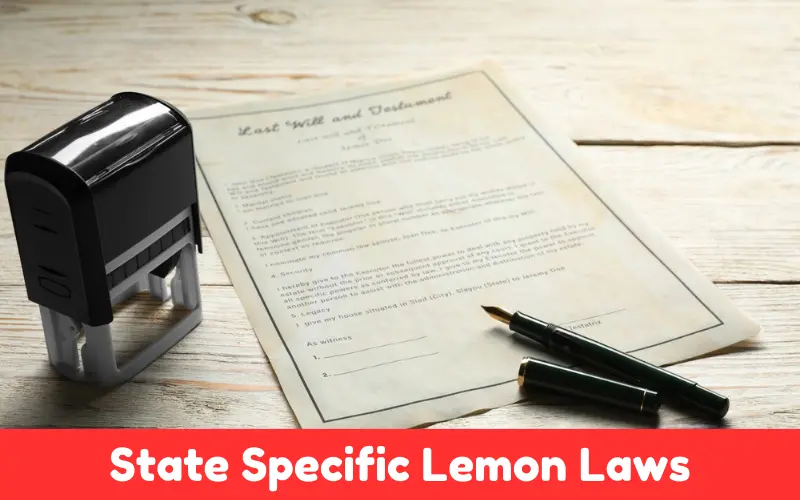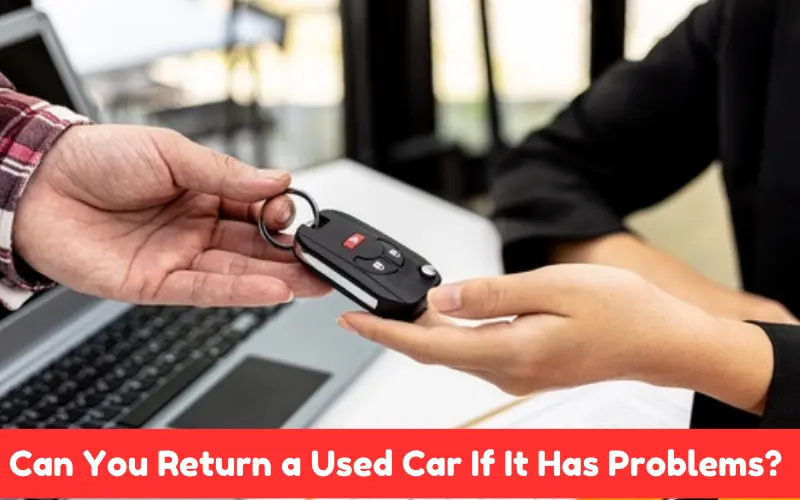If you’ve bought a used car, your joyride might come to an end if the car develops problems, especially if it’s still under warranty. While some dealerships offer limited warranties, state laws also might protect you, so it is important to understand what those terms are and exactly what is covered by your warranty.
If residing in Enid, OK, and are planning on purchasing used cars in Enid, OK, it is very important to know about the dealership policies and whether your state offers any additional type of protection for such cases.
Keep detailed notes about any issues and contact the dealer or the seller immediately to see if you can resolve the problem. If not, read below to learn can you return a used car if it has problems? Know your rights!
Article Summary
Can You Return a Used Car If It Has Problems?
If you are looking to return a used car due to problems, but it was purchased, it depends on the dealership’s policy and whether it is covered by law in the state you reside in. Most of the sales are final, but some states offer protection for their people.
Here we are, having bought a used vehicle, and it has its problems after the purchase. What are your rights to return that vehicle with problems to the dealership? I would think absolutely not, right? Or second guessing your decision. So, you purchase a used vehicle here.
You are, of course, excited to get into the used vehicle and hopefully enjoy driving it, but expectantly enjoying driving it.
However, could it be that there is something wrong with that vehicle? Say that the vehicle now has a problem and, without question, you bring it back to the dealership, hoping that it’s within warranty, that they fix the car, and that everything is fine.
These laws exist to prevent a consumer from being saddled with a lemon. Many people might think that the first course of action when they encounter a car issue would be to return the vehicle, but the truth is that every situation is different.
The answer is case specific, depending on the legal protections afforded, and also on the terms added by the seller of the car.
Protections for consumers can be very different from one place to another, so it’s important to act quickly and to be informed about your rights as a consumer.
Lemon Laws and Used Cars
The purchase of a second hand car can be quite risky for the buyer. If the car proves to be not working properly and the consumer faces problems after the sale, he can go to court, as such purchases are protected by lemon laws even on the used car market.
Countries all over the world have their lemon laws, but those differ from place to place. Nonetheless, the consumer is entitled to fulfill his rights if the recently bought vehicle turns out to be a failure.
The following text explains what lemon laws are and what types of claims in regard to used cars are possible.
State Specific Lemon Laws
That said, lemon laws do vary from state to state. For one thing, different states will have different rules about how a car can qualify as a lemon.

Some states have lemon laws that cover used cars, but others don’t. Be sure to look up the specific statutes in your state before filing a claim. A good place to look is by doing an internet search.
Lemon Law Qualifications For Used Cars
To qualify under lemon laws, a used car usually must:
- Have a substantial defect covered by a warranty.
- Experience the same problem after multiple repair attempts.
- Be within a certain period or mileage since purchase.
Keep records from every shop or mechanic you’ve interacted with. All your repair orders, all your notes from conversations with the dealer or mechanic, anything and everything.
These are the records you will offer when making your claim. Any buyers of used cars should check for state specific lemon laws so they know what to expect and how to handle a possible problem.
A good car means peace of mind. Lemon laws are a way of backing up that peace of mind.
Deceptive Trade Practices Acts
Buying a used car isn’t easy. Variations of the Deceptive Trade Practices Acts (DTPA) are laws to protect consumers. Under the DTPA, we cannot buy back a car if there are hidden problems after we test drive it.
Consumer Protection Against Fraudulent Sales
It protects buyers in several ways, one of which is to prevent sellers from lying about what they sell. For example, a seller must tell the truth about a used car that she sells. If he/she hides car problems, the DTPA might help the buyer.
- Truth in Advertising: Sellers must be honest in ads.
- Disclosure: Sellers must tell you about any car problems.
- Right to Sue: Buyers can take sellers to court if they lie.
Steps To Take If Sold A Defective Used Car
If a used car customer learns that a car sold to them has problems, they can wait for them, remedy them, or retract the sale.
- Check the Contract: See what it says about returns or problems.
- Collect Evidence: Gather all proof of the car’s issues.
- Contact the Seller: Talk to the seller about the problems.
- Report to Authorities: Tell the consumer protection agency.
- Consider Legal Action: Think about taking the seller to court.
Remember, each step is important. Acting fast can help solve the problem quicker.
Implied Warranties and Their Limitations
Purchasing a used automobile is one of the risky challenges faced by consumers. Luckily, they benefit from the protection of the law.
However, this protection is sometimes limited to implied warranties. The concept of implied warranty is derived from common law, and it is based on four principles.
Here is the summary of both the definition and application of these terms.
Understanding Implied Warranty of Merchantability
So what is this guarantee? It is just a promise. It says that I can expect that car to do what’s expected of it. It promises what’s basic: brakes, engine, transmission. It’s automatic. It’s supplied with the most complementary used car sales.
Cars must be fit. For example, they must be able to drive. They must match the seller’s description. If something major tends to be wrong with the car, the warranty is broken.
When Implied Warranties Don’t Apply
Not all sales have this warranty. This is the case with ‘as is’ sales. No warranty is given. Buyers assume all risks.
The laws vary in some states, ‘as is’ sales are prohibited. In others, they are allowed. Check the laws in your state.
While dealers are also allowed to disclaim a warranty, they must strictly abide by certain rules. Both the disclaimer and the reason for it must be clear. Thus, it must be in writing.
If they have a problem later on, buyers should be able to show proof of if they want a refund. Usually, the information about the warranty is in the buyer’s guide. This is (D) on the picture displayed on cars they want to buy.
Warranties may not cover everything. Some questions are best left unanswered. When in doubt, read the fine print. Always ask. Get it in writing. What have we gotten ourselves into this time?
Negotiating with The Dealer
Whenever we want to buy a used car, there are always different kinds of worries. A problem could come up after the purchase. When a problem arises, we need to formally agree with the dealer.
The way we handle it will determine the result. In this essay, I’ll discuss some effective methods to deal with this problem.
On the one hand, it’s important to clearly express our objections and justify them. For example, if we suspect a problem with a service part in a very short time after purchasing the car, we can directly accuse the dealer of bait and switch our money.
If this doesn’t work, it’s best to directly ask for goods identification or precisely describe what the problem is so that the dealer can examine the car with us.

On the other hand, we can use our rights when it comes to choosing vehicles to turn the situation around.
For instance, if the dealer refuses to negotiate, it’s wise to provide more options, such as comparing another similar car elsewhere.
If the dealer doesn’t agree, you can request to see a similar car of the same brand at a similar price but more suited to their needs. By the end of this process, we can hope to reach a favorable result through negotiation.
Effective Communication Strategies
Good communication lies at the base of every negotiation. Start with the facts. Be brief. Mention the problems with your car.
Write the issues you are concerned about. Speak professionally. Say your key points. Write down all the problems with the car. Get some evidence. Examples are photos and service reports. Prefer solutions to arguments.
As a consumer, a nice point to make is to suggest how to fix the problem, at the very least, if the car cannot be returned to you. Be calm. Be friendly.
Seeking Mediation or Legal Counsel
They sometimes refer to standstills. You should consider using a mediator. Mediation is a neutral platform.
Enter a lawyer. Lawyers understand a consumer’s rights perfectly. They take you through very complicated processes. A small claims court solves the problem.
Remember that the routes of law are difficult. Be prepared. Provide all the purchase papers. Have your service history and communication records.
Your lawyer will guide you through the process and advise you on its best use.
FAQs on Can You Return a Used Car If It Has Problems? Know Your Rights!
How Many Days Do You Have To Return a Used Car in Texas?
Cars sold by self-service companies in Texas come with no return period. Consumers are advised to check thoroughly and confirm terms before making the purchase, as sales are final.
How Many Days Do You Have To Return a Used Car in North Carolina?
In North Carolina, as is generally the case across the US, there is no statutory right to return a car once you buy it from a dealer. If the buyer has purchased a lemon and wants to return the vehicle, there is nothing to do but hope the seller is generous enough to offer a return policy.
Is There a Texas Lemon Law For Used Cars?
There is a Texas lemon law, but in general, this only applies to new vehicles. For used cars, protection may be limited and possibly burdened by pre-existing warranty or dealer warranty agreements. Anyone in the market for a used car would be well advised to find out what their rights and potential options may be under Texas law.
Conclusion
It’s never easy to return a used car with problems. Not only can the process be complicated, but your rights and options will depend on where you live and the policies of the dealer.
Always read the purchase agreement and ask for help when necessary to ensure you’re keeping your investment safely in your hands.
Arm yourself with knowledge of your consumer power. Drive with confidence, informed, and prepared for any bumps in the road.

